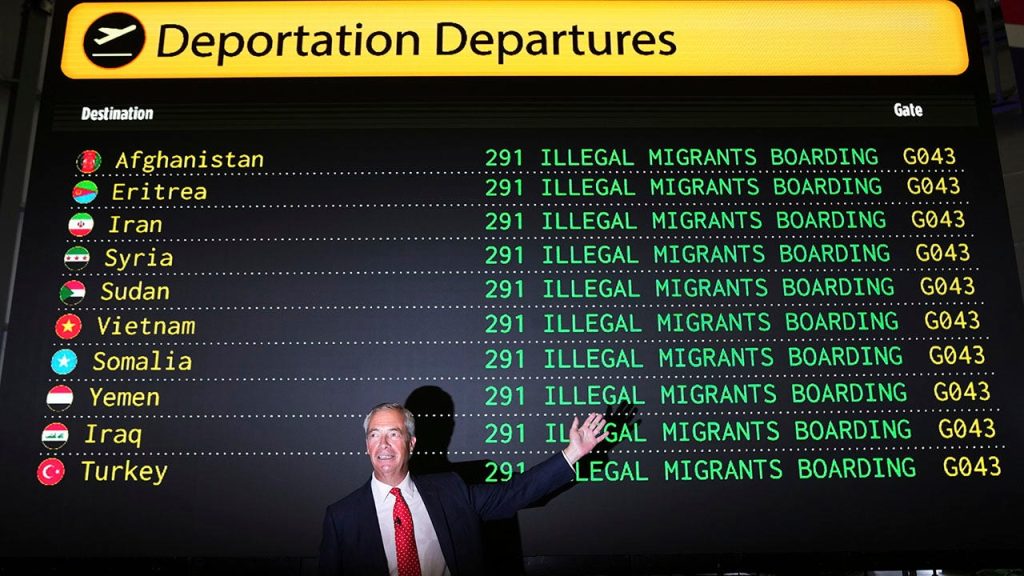Reform UK’s Controversial Immigration Plan: A Call for Mass Deportation
In a bold and contentious move, Reform UK has unveiled a sweeping immigration proposal that has ignited fierce debate across Britain’s political landscape. Party leader Nigel Farage announced what he calls “Operation Restoring Justice,” a plan to deport approximately 600,000 asylum seekers from the United Kingdom. The proposal represents one of the most aggressive approaches to immigration reform in recent British history, with Farage framing it as a necessary measure to prevent what he dramatically describes as “major civil disorder” and an “invasion” of young men “illegally breaking into our country.” The controversial plan hinges on several radical legal changes: withdrawing Britain from the European Convention on Human Rights, repealing the Human Rights Act, and abandoning international treaties that currently prevent forced deportations. These protections have long served as crucial safeguards for asylum seekers and have repeatedly been used to halt deportations of migrants deemed to be in the country illegally.
At the heart of Reform UK’s proposal is a strict approach to migrants crossing the English Channel in small boats. Farage insisted that those intercepted at sea should be immediately detained and subsequently deported, arguing this approach would rapidly eliminate the incentive for dangerous Channel crossings. “If we do that, the boats will stop coming in days because there will be no incentive,” Farage claimed during his press conference. This hardline stance comes against the backdrop of Britain receiving a record 108,100 asylum applications in 2024, with significant numbers coming from Pakistan, Afghanistan, Iran, and Bangladesh. The timing of this announcement is particularly notable, following weeks of small but vocal protests across Britain concerning mass migration and crimes allegedly committed by some asylum seekers, events that have heightened tensions in communities already divided over immigration policy.
The political implications of Reform UK’s proposal extend beyond the immediate controversy surrounding its content. Despite holding only four seats in Parliament, recent polling suggests Reform UK is leading in surveys of voting intentions, indicating the immigration issue has struck a powerful chord with a significant portion of the British electorate. Indeed, polling data reveals immigration has now overtaken the economy as voters’ top concern, a shift that helps explain Reform UK’s growing popularity despite its limited parliamentary representation. This groundswell of support demonstrates how immigration has become perhaps the most divisive and emotionally charged political issue in contemporary British politics, capable of reshaping traditional voting patterns and allegiances.
Critics have been swift and unsparing in their condemnation of Reform UK’s proposal. Labour Party Chairwoman Ellie Reeves dismissed the announcement for lacking substantive detail, stating, “Today, we got none of those things, nor a single answer to the practical, financial, or ethical questions about how their plan would work.” Housing Minister Matthew Pennycook went further, characterizing the proposals as merely “a series of gimmicks” that would ultimately prove ineffective. More fundamentally, Reform’s political opponents and numerous charitable organizations have warned that implementing such a plan would effectively amount to Britain abandoning its long-standing human rights commitments, potentially damaging the UK’s international standing and moral authority on human rights issues globally.
The legal implications of Reform UK’s proposal cannot be overstated. The European Convention on Human Rights has been a cornerstone of UK human rights law since its inception, providing essential protections not just for migrants but for all individuals within British jurisdiction. Withdrawing from this convention would represent a seismic shift in Britain’s legal framework and would place the UK in the company of only one other European nation (Belarus) that stands outside this human rights agreement. Legal experts have pointed out that such a withdrawal would not only affect immigration cases but could potentially undermine fundamental rights protections across numerous areas of British life, creating legal uncertainty and potentially rolling back decades of human rights progress in the United Kingdom.
The debate surrounding Reform UK’s proposal ultimately reflects deeper questions about British identity, values, and place in the world post-Brexit. For supporters, the plan represents a necessary reassertion of national sovereignty and border control, addressing what they perceive as an unsustainable situation with direct impacts on public services, housing, and community cohesion. For critics, it represents an alarming retreat from international norms and humanitarian obligations, potentially undermining the very values that have defined Britain’s role as a champion of human rights. As the conversation continues, British society faces profound choices about how to balance competing priorities: national security concerns, humanitarian obligations, international commitments, and domestic social harmony. What remains clear is that immigration will continue to dominate British political discourse, with Reform UK’s controversial proposal marking not the end but rather an escalation in one of the most consequential debates in modern British politics.


